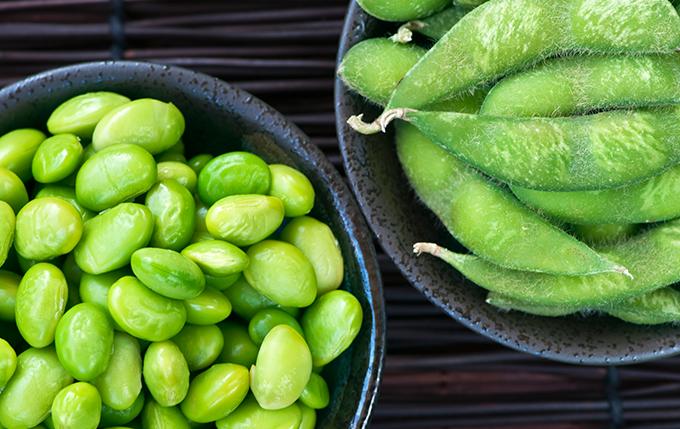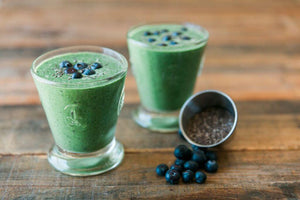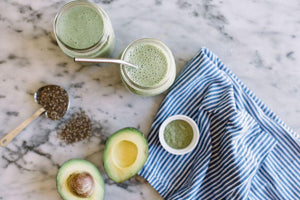
Vegan, Vegetarian or Raw; here in Los Angeles meat free can be the new normal. At beWELL, we support our meat free clients and help them incorporate protein to balance blood sugar throughout the day, we just recommend they do it soy free!
Here are the scientific reasons why you should be avoiding this so called “health food”:
Soy phytoestrogens disrupt endocrine function and have the potential to cause infertility and to promote breast cancer in adult women. Soy phytoestrogens are potent antithyroid agents that cause hypothyroidism and may cause thyroid cancer. In infants, consumption of soy formula has been linked to autoimmune thyroid disease.
Phytic acid in soy reduces assimilation of calcium, magnesium, copper, iron and zinc. Phytic acid in soy is not neutralized by ordinary preparation methods such as soaking, sprouting and long, slow cooking. High phytate diets have caused growth problems in children.
Vitamin B12 analogs in soy are not absorbed and actually increase the body’s requirement for B12
Soybeans are not a complete protein. They are deficient in sulfur-containing amino acids methionine and cystine. In addition, modern processing denatures fragile lysine.
Trypsin inhibitors in soy interfere with protein digestion and may cause pancreatic disorders. In test animals soy containing trypsin inhibitors caused stunted growth.
Soy foods increase the body’s requirement for vitamin D.
Soy also lacks cholesterol, likewise essential for the development of the brain and nervous system. (you need cholesterol, it doesn’t cause heart disease and we will bring you up to speed on this topic soon!)
Soy foods have a high concentration of goitrogens which block production of thyroid hormone
Processing of soy protein results in the formation of toxic lysinoalanine and highly carcinogenic nitrosamines, fragile proteins are denatured during high temperature processing to make soy protein isolate and textured vegetable protein.
Free glutamic acid or MSG, a potent neurotoxin, is formed during soy food processing and additional amounts are added to many soy foods.
Soy foods contain high levels of aluminum which is toxic to the nervous system and the kidneys.
Soy isoflavones are phyto-endocrine disrupters. At dietary levels, they can prevent ovulation and stimulate the growth of cancer cells. Eating as little as 30 grams (about 4 tablespoons) of soy per day can result in hypothyroidism with symptoms of lethargy, constipation, weight gain and fatigue.
Archer Daniels Midland (ADM) recently withdrew its application to the FDA for GRAS status (“generally regarded at safe”)for soy isoflavones following an outpouring of protest from the scientific community. The FDA never approved GRAS status for soy protein isolate because of concern regarding the presence of toxins and carcinogens in processed soy.
APPROVED SOY PRODUCTS:
This list is not meant to scare you or make you feel quilty about the quantity of soy lattes you have ingested over the years. We are here to educate you so that you can make decisions about protecting yourself and your family moving forward. That being said, the only soy with health benefits is organic soy that has been properly fermented. After a long fermentation process, the phytate and “anti-nutrient” levels of soybeans are reduced, and their beneficial properties become available to your digestive system.
Here is the beWELL list of soy approved products:
Tamari, which is traditionally made by fermenting soybeans, salt (This is a gluten free Soy Sauce, soy sauce is also fermented properly, Brags Aminos is organic but not fermented, replace brags with Tamari)
Miso, a fermented soybean paste with a salty, buttery texture (commonly used in miso soup).
Natto, fermented soybeans with a sticky texture and strong, cheese-like flavor.
Tempeh a fermented soybean cake with a firm texture and nutty, mushroom-like flavor.
Soy Lecithin:
Now that you are versed on the good, the bad and the ugly, lets talk about the elephant in the room, Soy Lecithin. (No, we aren’t here to take away your dark chocolate.)
Lets just get to the facts:
Lecithin is used as an emulsifier and is a mixture between phospholipids and oil (normally 35% soybean oil and 16% phosphatidylcholine)
Good news; Phosphatidylcholine is good for you; a brain food found in eggs and liver.
-
Bad news; to make soy lecithin, soybean oil is extracted from the raw soybeans using a chemical solvent (hexane).
The FDA doesn’t regulate the amount of hexane residue in food products, but they do in pharmaceuticals.
Total pesticide residues in crude soy oil are around 400ppb on average.
Most soy grown in the US is genetically modified, so unless the label says ‘organic soy lecithin,’ it probably came from a genetically modified soybean.
Soy lecithin normally makes up no more than 1% of processed foods.
NOW WHAT?
Our recommendation is to avoid soy products most of the time. Enjoy your sushi with a little tamari and if you are craving miso soup, purchase the organic miso paste and make your own full of fresh veggies sans tofu. Please don’t feed your kids chickn’ fingers and tofu sticks, its GMO and taxiing on their entire system and yours. If you include tempeh as your form of vegetarian protein be aware you need to supplement with forms of methionine, cystine and lysine. A little dark chocolate that contains soy lecithin is not the end of the world; you are getting more of a chemical toxic load from running the smoggy streets of LA and applying your red carpet ready makeup. That being said if you eating processed bars and consider yourself a cracker junkie, you are probably overdoing the soy lecithin and raw chocolates can be found SL free.
Be Well. Be Beautiful. Be YOU!
Learn More:
http://www.farmtoconsumer.org/news/060810–No_Response_from_FDA_Soy_Petition_060710.pdf
http://www.westonaprice.org/soy-alert/studies-showing-adverse-effects-of-soy








